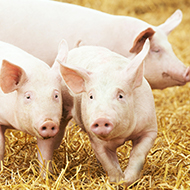Pirbright/Oxford COVID-19 vaccine shows 'promising results'

The candidate vaccine, RBD-SpyVLP, produced a strong antibody response in mice and pigs.
A new COVID-19 vaccine being developed by researchers at The Pirbright Institute and the University of Oxford has shown 'promising results' in early animal studies.
The candidate, named RBD-SpyVLP, was found to produce a strong antibody response in mice and pigs. Although the vaccine is not a competitor for the first round of vaccines, researchers hope that it will prove useful as a stand-alone vaccine, or a booster for individuals primed with a different COVID-19 vaccine.
Oxford's RBD-SpyVLP vaccine contains part of the SARS-CoV-2 spike protein called the receptor-binding domain (RBD) - a range of protective neutralising antibodies that can bind in a way that blocks infection. The RBD is attached to a virus-like particle (VLP) that contains no genetic material using Oxford’s SpyTag/SpyCatcher technology, a kind of protein ‘superglue’
The scientists found that RBD-SpyVLP produces a strong neutralising antibody response. They also examined samples taken from the nose and mouth of vaccinated pigs and found SARS-CoV-2 specific antibodies were present. This a promising finding, given that antibodies at the site of entry for SARS-CoV-2 could be important for providing robust protection.
Interestingly, the team found no difference in the magnitude of antibody response when comparing vaccine dose levels. This suggests that the smaller dose tested, which is the same as intended for human administration, may provide equal protection to larger doses or that even lower doses of the vaccine may be effective.
Pirbright’s pig model has previously been used to test Oxford’s ChAdOx1 nCoV-19 (AZD1222) vaccine, which showed that two doses produced a stronger immune response in pigs than one.
Pigs have similar immune, respiratory and physiological characteristics to humans, and can therefore provide vital knowledge about the response to candidate vaccines that can inform human clinical trials. This model has been shown to predict vaccine outcome in humans, particularly in influenza studies.
Professor Simon Graham, who led the pig studies at Pirbright, said: “These results offer valuable insights into the kind of immune responses that the RBD-SpyVLP vaccine could trigger in humans. Further understanding the dose required to elicit a strong immune response is key for the progression of vaccine development and scaling up for manufacture.”
Researchers also tested the stability of the vaccine and found that RBD-SpyVLP is highly resilient, stable at room temperature and can be freeze-dried without losing its power to immunise. These properties would reduce dependence on cold chains for transport and storage and facilitate global distribution.
The study, A COVID-19 vaccine candidate using SpyCatcher multimerization of the SARS-CoV-2 spike protein receptor-binding domain induces potent neutralising antibody responses, is published in the journal Nature Communications.



 RCVS Knowledge has welcomed Professor Peter Cockcroft as editor-in-chief for Veterinary Evidence.
RCVS Knowledge has welcomed Professor Peter Cockcroft as editor-in-chief for Veterinary Evidence.